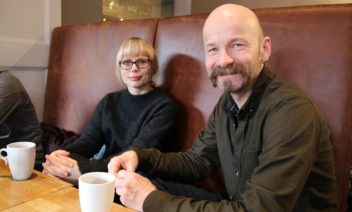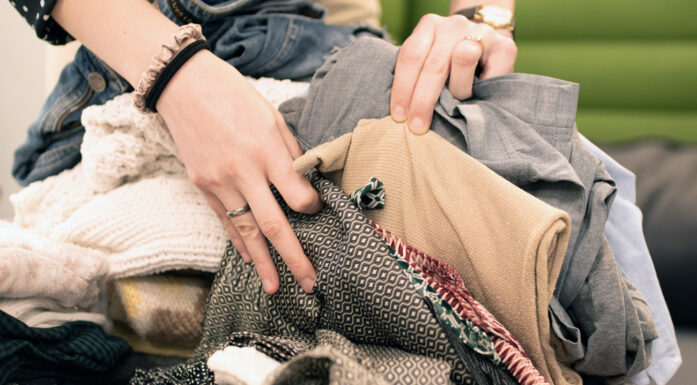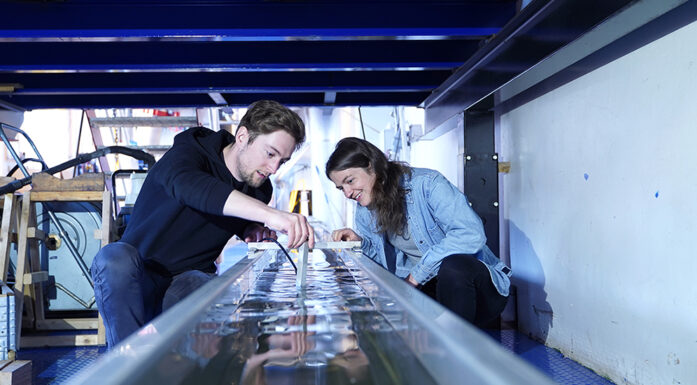Your new office serves lattes
More and more people are heading to coffee shops to do work. And at the same time they’re changing cafe culture.
It’s 10:45 on a Tuesday morning. A girl is sitting with her PC over by the window. She looks like she’s working. Two or three others have PCs or tablets in front of them, all more or less active. This could be an open office landscape, but it isn’t. You can choose from any number of available seats.

Ida Marie Henriksen and Aksel Tjora study the sociology of cafe guests. Photo: Steinar Brandslet, NTNU
At 11 o’clock prams and lunch guests fill the cafe, the coffee machine hisses and spits as espresso is poured into complicated cups, and luscious cakes disappear from the display case. Soon space at the tables is cramped. Now it’s less reminiscent of an office.
But Professor Aksel Tjora and PhD candidate Ida Marie Henriksen , both of NTNU’s Department of Sociology and Political Science, have their spot on the couch, each with their simple cup of black coffee from the coffee shop’s thermal carafes. Is working in cafes a growing trend?
“Yes, and it’s probably first and foremost the possibilities that have changed the scene,” says Tjora.
- You might also like: Brewing Viking beer — with stones
New possibilities
Access to free wireless networks, combined with smartphones, tablets and small laptops, allows more people to take their job out of a physical office. Henriksen and Tjora conduct sociological studies of community, technology and physical space. Studying how the use of these new opportunities contributes to changes – not only for users, but also for work practices, places and social relationships – has become an important part of their research.
In the last few decades, cafes have gradually become the work place of choice for many more people than just those employed there.
But very few people hang out in a coffee shop for long periods. They may hold a meeting there, or spend only part of the working day at a cafe.

Do people really get work done at cafes, or is it an excuse to loaf around and socialize? Photo: Thinkstock
Working customers aren’t only changing their own habits; they’re also changing coffee shops into something different than they have traditionally been. Cafes are redefining their role, both physically and conceptually.
This trend “is changing the experience we have in cafes,” says Henriksen.
Henriksen is the first author of the study “Situational Domestication and the Origin of the Cafe Worker Species”, which looks at people who turn cafes into their offices. She and Tjora have been observing people in coffee shops in Norway, England, the United States and Australia for several years.
- You might also like: Team-building doesn’t really work
Cafes in flux
Some coffee shops – by their design – are more inviting than others to work in.
You find cafes where some chairs face the window instead of a table that encourages conversation. People who bring their jobs and one or more data gadgets to the cafe usually use these outward-facing seats, which also allow them to watch passers-by outdoors.
Cafes that want to attract working customers also need to offer access to power outlets.
“The quality of the coffee comes second,” says Tjora.
Working customers may not choose coffee shops that are best suited for prams, at least not during busy lunchtime hours.
Become more creative
But do people really work in cafes, or is it an excuse to loaf around and socialize?
“The steady background noise doesn’t bother them,” says Tjora, who does a lot of his work in cafes, especially when he travels.
He says what is important is the social aspect, and is a big fan of bringing more students to downtown Trondheim, so they can be part of another environment.
All office spaces of a certain size probably have at least one person who complains because their colleagues have shoes with squeaky soles, or their laugh is too loud, or they wear perfume that the complainer believes she or he is allergic to.
But cafe workers who do all or part of their work in cafes find that meeting other people allows them to be more creative, and they work more productively when there’s activity around them all the time.
They concentrate better when others can follow what they’re doing, and the white noise of surrounding table conversation creates an atmosphere where they can work alone, but still feel like they are part of a kind of work community, researchers say.
Others just need a break that can help shift their thinking in new directions before they return to the office. Some people mostly surf online while they are out, but it may make them more productive when their mind returns to their work tasks.
- You might also like: Living with zero-emission technology
Cost savings
At the same time, the labour market is changing. The regular employee of today is different than a few decades ago. More and more people are freelancers or have a home office. For them, the cafe can provide a more social alternative to sitting alone.
Others may only be travelling through, and use their time to be productive while waiting to move on. Coffee shops are easily accessible places to work.
Although not a big factor in Norway, where most people can afford their own internet access, some people frequent cafes with their laptops for the Internet connection.
“Here we take it for granted that internet access in cafes should be free,” says Henriksen
It’s also usually cheaper to have a cup of coffee – or several – in town than to rent office space. Cafes offer a viable alternative to save on costs.
Draws more customers
Can it be profitable for cafes to have people who just drink a few cups of coffee, but who take a table, sometimes for several hours?
“I’ve never heard a negative comment from any of the staff at the cafes,” says Henriksen.
For one thing, there is a kind of unwritten contract that exists, a mutual understanding between customers and the cafe. You can’t sit for an unlimited amount of time and sip on just one cup of coffee. Maybe you have several. Maybe you buy lunch there. Or maybe you rotate among multiple cafes during the day, so you can spread your cups of coffee around.
But one customer can also help draw more people into the cafe. People usually go to coffee shops where other people are already found. It’s a shared social activity. Only a few people go to a cafe for solitude. So working customers attract more customers.
According to Tjora, people who use the cafe as an office are part of the reason why more people in general use cafes than before.
“An important aspect is that working customers are also changing cafe culture. The eating-out sector is really growing in downtown Trondheim,” Tjora says.
So, people with a cafe “office” are contributing their bit to creating more vibrant downtowns.
Reference: Situational Domestication and the Origin of the Cafe Worker Species. Ida Marie Henriksen, Aksel Tjora. Sociology. DOI: 10.1177/0038038516674663








